- Home
- Media Kit
- MediaJet
- Current Issue
- Past Issues
- Ad Specs-Submission
- Reprints (PDF)
- Photo Specifications (PDF)
- Contact Us
- PRIVACY POLICY
- TERMS OF USE
![]()
ONLINE
![]()
ONLINE

The Forgotten Child
of the Capital System
Editors’ Note
Badr Jafar is also President of Crescent Petroleum. He is the Managing Director of Crescent Group, which has been operating from the UAE as a family business group for 50 years, and is the parent company of Crescent Enterprises and Crescent Petroleum. Jafar serves as Chairman of Gas Cities, a joint venture between Crescent Petroleum and Dana Gas PJSC, and as Chairman of Pearl Petroleum, a partnership between Crescent Petroleum, Dana Gas, OMV of Austria, MOL of Hungary, and RWEST of Germany. In 2010, Jafar founded the Pearl Initiative, a nonprofit organization in cooperation with the United Nations Office for Partnerships, to promote a corporate culture of transparency and accountability across the Gulf Region of the Middle East. He has been appointed as a member of the United Nations Secretary General’s High-Level Panel on Humanitarian Financing, a member of the UNESCO International Commission on the Futures of Education, a member of the Board of Overseers of the International Rescue Committee (IRC), and a member of the Board of the International Peace Institute (IPI). Jafar is also appointed to serve on the Advisory Committee and as Special Representative for Business & Philanthropy for the 28th Conference of the Parties (COP28) to the United Nations Framework Convention on Climate Change (UNFCCC). Jafar has a longstanding engagement with the World Economic Forum, and was recognized as a Young Global Leader in 2011. Jafar is currently acting as a member of the WEF Stewardship Board on New Economy and Society, the WEF Stewardship Board on Digital Economy and New Value Creation, the WEF Board of Leaders for a Sustainable Middle East and North Africa and is Co-Chair of the WEF Family Business Community. Jafar also serves as a Champion of the WEF EDISON Alliance, WEF Reskilling Revolution and GAEA – Giving to Amplify Earth Action, a global initiative to fund and grow new and existing public, private and philanthropic partnerships (PPPPs) to help unlock the financing needed to reach net zero, reverse nature loss and restore biodiversity by 2050. He is a member of the International Institute for Strategic Studies (IISS) Advisory Council. Jafar holds a master’s degree in engineering from the University of Cambridge and a business degree from the Cambridge Judge Business School.
Company Brief
Crescent Enterprises (crescententerprises.com) is a multinational company headquartered in the United Arab Emirates. It operates under four platforms: CE-Operates, CE-Invests, CE-Ventures, and CE-Creates, which span diverse sectors including ports and logistics, power and engineering, food and beverage, business aviation, and across verticals such as private equity, venture capital, and business incubation.
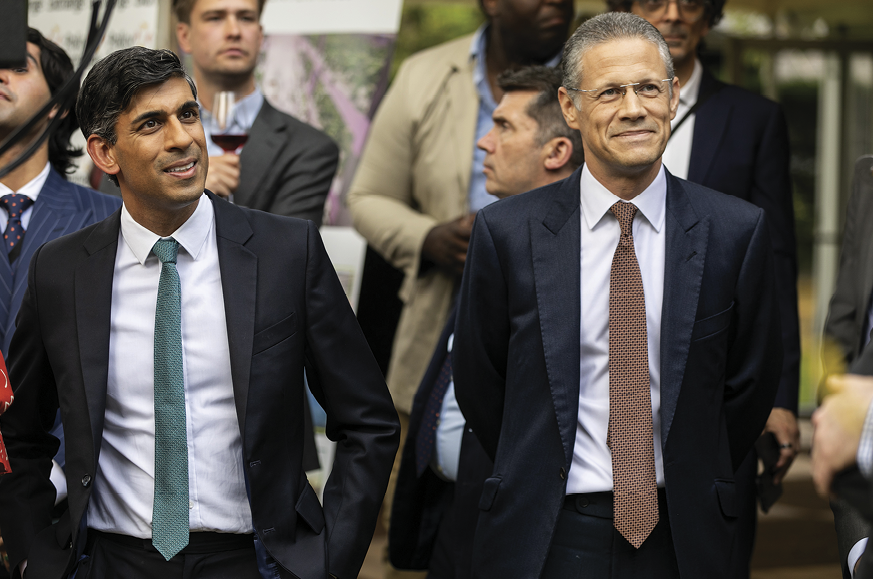
Badr Jafar and Prime Minister Rishi Sunak of the UK
in London in June 2023
What does the concept of philanthropy mean to you in practice?
Philanthropy is an ancient human practice, going back probably as far as human beings have lived together in groups. The word itself is composed from the original Greek root philo- (meaning a love of) and anthropos (human) to create philanthropia or “love of humankind”. The Romans translated philanthropia as simply humanitas, humanness. It is used interchangeably with charity, or caritas, from the Latin altruistic love.
In practice, philanthropy has often been translated as almsgiving, the sharing of resources with others who are less fortunate. I don’t like this term as much as it originates from the word eleos, meaning “pity or mercy” which I find to be degrading. Of course, there are many other terms used in different cultures and faiths, including: zakat (to purify or cause to grow); sadaq, Daana in Buddhism and Hinduism, Tzedakah in Judaism. All essentially the same principle but with some philosophical nuances and variances in practice.
Today, the act of philanthropy can encompass many things: individual charity, religious almsgiving, corporate sponsorship, traditional grantmaking by endowed foundations, and strategic philanthropy practiced by individuals or foundations. It’s not just about the money. It can take forms beyond the simple giving of money and include donations of goods and services, volunteering, mentoring, and sharing of intangible assets like data (e.g. medical philanthropy with open sourcing intellectual property, such as vaccine tech). The big differentiation I like to make between charity and philanthropy is seeing philanthropy, or more specifically strategic philanthropy, as impact-driven giving that is evidence-based and uses disciplined planning, execution, and diligent follow-through in order to achieve intended results.
When you think about it, the discipline applied is no different to strategic investing, where you take calculated risks based on data (wherever available) and analysis, and make sure you properly track your returns to inform your future investment behavior. Except in this case, it is social or environmental returns you’re concerned about, not financial returns.
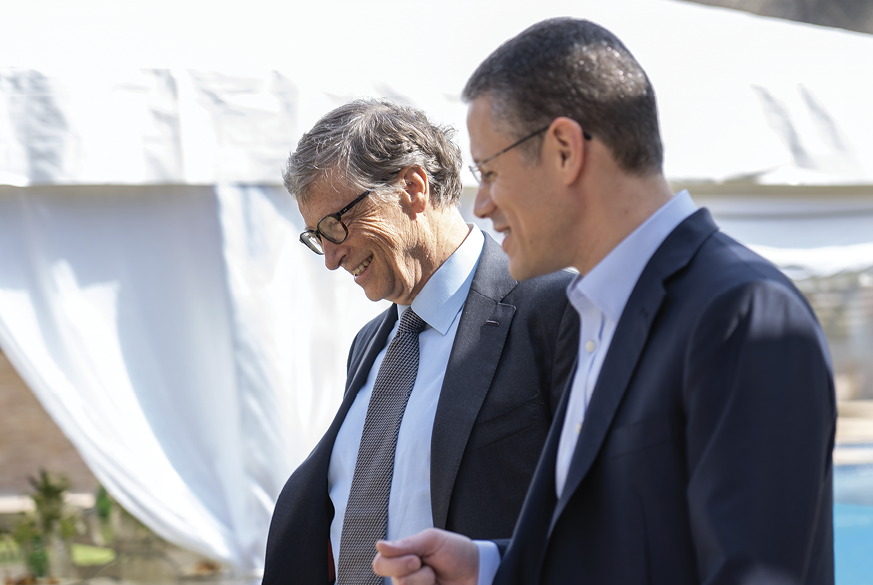
Bill Gates with Badr Jafar during a visit to
the UAE in November 2019
What drives your personal approach to philanthropy?
Having initially been unsuccessful in launching a number of start-ups when I left Cambridge in the early 2000s, I eventually succeeded with a fashion e-commerce startup and made my first $1 million selling the business to a Japanese conglomerate. I spent half that money on launching a failed business, a quarter of it in a portfolio of stocks that lost most of its value in the dot-com crash, and gave a quarter of it away on a host of different causes, primarily humanitarian causes – but with a lot of experimentation.
Over the years, I’ve become far more disciplined and focused in my approach to giving, with the overarching focus on providing “better rods,” or tools, instead of “giving fish,” or even “teaching to fish.” For me, this manifested in building better infrastructure to support strategic giving across global growth markets, such as through a number of Centers for Strategic Philanthropy; HasanaH – a community-driven digital platform aimed at empowering donors of all faiths; and Pearl Initiative – a nonprofit organization focused on promoting the business case behind corporate governance. My hope is that this will lead to more programs and institutions in these markets dedicated to enhancing the regulatory frameworks upon which philanthropy is practiced, better localized research and data that reflects local priorities, and stronger governance models to organize philanthropic work and make it easier to pool resources for longer-term impact.
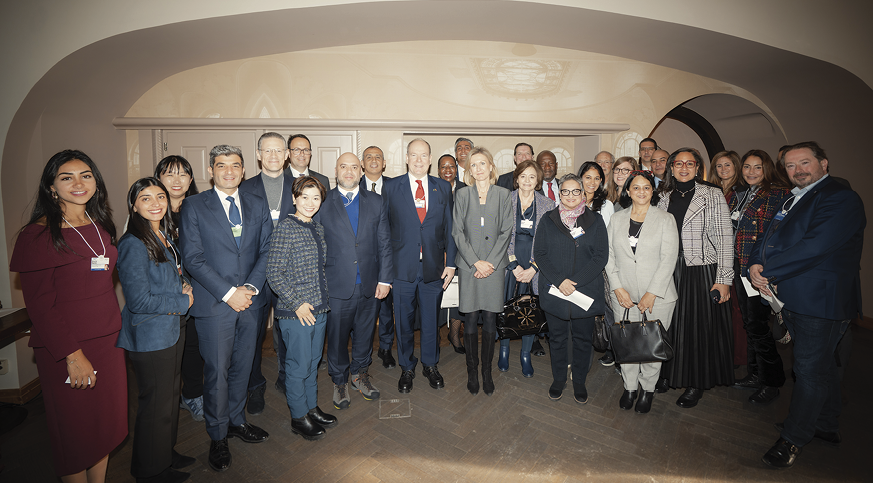
A convening on Climate and Nature Positive Philanthropy
hosted by H.S.H. Prince Albert II of Monaco and
Badr Jafar in Davos in January 2023
Will you share your thoughts around where you think the MENA region is today versus where it was 15 years ago with regards to philanthropy and the role it plays in supporting society?
It is estimated that more than $5 trillion of wealth in the top 30 growing economies, which includes the MENA region, will be passed from one generation to the next within the next decade. This suggests a substantial increase in philanthropic activities within these societies in the near future. This next generation of philanthropists is reshaping the practice of giving by demanding more hands-on approaches and embracing boundary-blurring innovations to achieve greater impact. They aim to align their philanthropic endeavors with national priorities, giving philanthropy a greater role to play in shaping the future of strategic giving in the Arab region.
This underlines the need for greater transparency and accountability to ensure philanthropists can correctly measure their impact over time. Emerging digital tools and platforms are making giving significantly more accessible, and disruptive technology is enabling the gathering, processing, and understanding of philanthropic data more efficiently than ever before.
The Arab region is renowned for its generosity, presenting a huge opportunity to establish the necessary structures and platforms to nurture a new generation of philanthropists and philanthropic ventures by forging partnerships with government and business sectors to address our most urgent challenges using the principles of strategic philanthropy that is transparent in its application and results-driven.
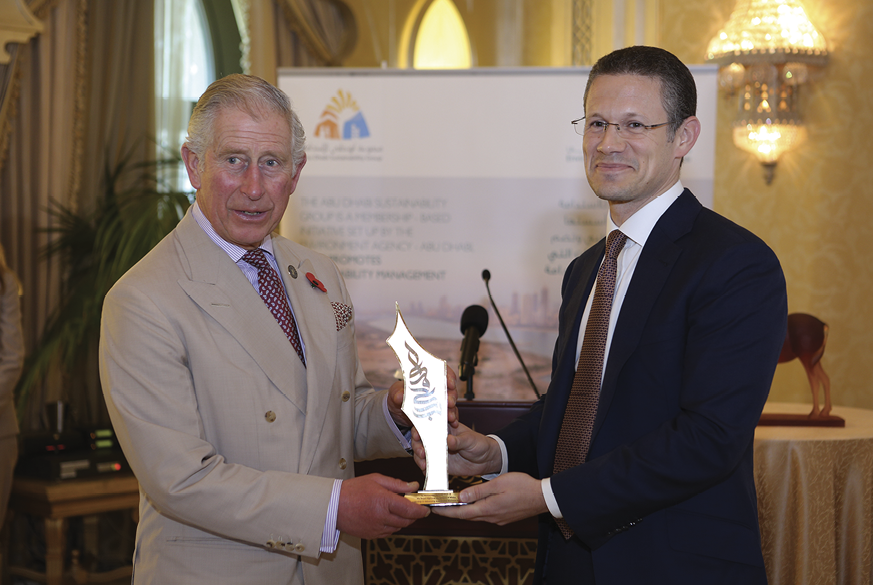
Badr Jafar presents His Majesty King Charles III
with the Pearl Initiative Champion of Sustainability Award
in 2016
What are the future key trends shaping philanthropy and how is philanthropy deployed in different parts of the world?
I think there are a few super exciting trends and shifts shaping philanthropy. Over the next 15 years, $68 trillion is expected to be passed down to the next generation globally, making it the largest intergenerational wealth transfer in history. Coupled with a rapid increase in private wealth generation within growth markets, we will see a corresponding major boost in philanthropy from these regions.
Meanwhile, this next generation of philanthropists is transforming the practice of philanthropy, with a growing emphasis on accountability and transparency. As evidence-based intervention becomes the norm, demands on quality data collection and analysis will increase.
Technology is also redefining the way that we coordinate activities around giving. With the growth of digital platforms in this sector, we are seeing a shift from a “one-to-many” model of philanthropy – i.e. wealthy donors supporting a vast number of beneficiaries – to a “many to one” model, where entities seeking help can source smaller donations from an infinite pool of “retail” donors.
As more philanthropy becomes strategic in nature and works on system change as opposed to symptomatic relief, we are witnessing more collaboration within the sector where philanthropists share learnings, such as the Giving Pledge, but are also co-investing their philanthropic capital towards common goals – thereby enhancing economies of scale, and creating true communities of giving.
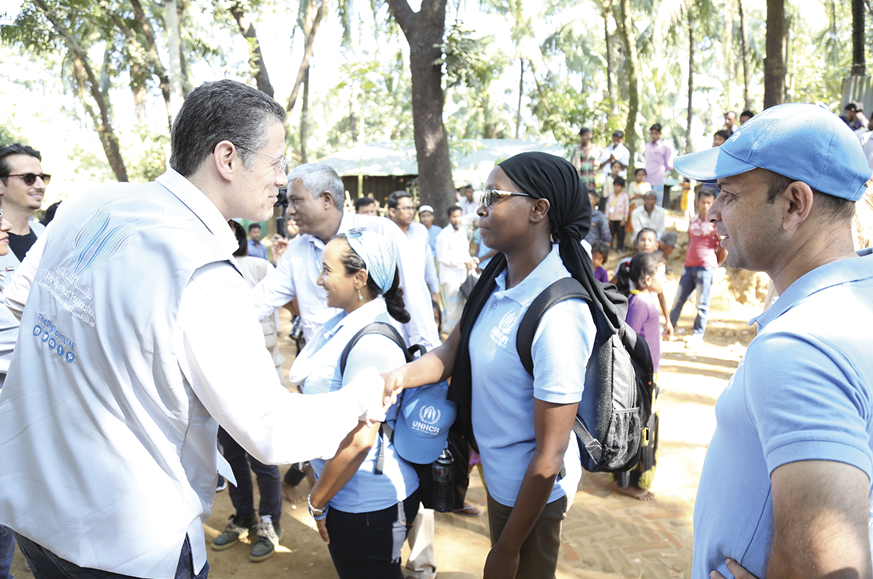
Badr Jafar visiting Kutupolang Camp in Bangladesh
with the Big Heart Foundation in 2017
You have been appointed by the UAE COP28 Presidency as a special representative for business and philanthropy. How does COP28 plan to engage the climate philanthropy community?
The COP28 Presidency fully recognizes that addressing the climate crisis is an enormous undertaking, with projections of $4 trillion to $9 trillion per year required to support our net-zero and nature-positive goals. No single funding source will have the capacity or solutions to meet these needs. However, philanthropic resources can play a critical role in catalyzing both public and private finance to unlock the trillions of dollars that are needed towards both adaptation and mitigation outcomes. COP28 in the UAE will raise the bar in terms of ambition and the creation of a global architecture for all capital actors to act together at speed and at scale.
Overall, the trends for greater philanthropic engagement are positive. ClimateWorks data shows philanthropic foundation funding for climate mitigation more than tripled in the past five years, growing to $3 billion per year. During that same period, the number of grantees receiving climate mitigation funding nearly doubled. However, the top regions to receive climate change mitigation funding last year were the United States, Canada, and Europe, according to the ClimateWorks report. Africa and Latin America combined represented less than 10 percent of total foundation funding.
A key focus for COP28 will be to ensure proper engagement from these regions of the world that stand the most to gain from climate action to help funnel more funds into these regions and from within these regions. This effort will need to be anchored in frameworks of collaboration and co-creation, built around a common sense of purpose and urgency.

Filming of Tomorrow/Bokra (charity anthem) with
Quincy Jones and children in Rabat, Morocco
For many years you’ve been working to promote strategic philanthropy across the emerging markets including the Middle East. How do you see those efforts feeding into elevating the role of climate philanthropy across these markets and what needs to happen to see more engagement in this space?
While I am no expert on philanthropy or on climate change, I am a good student of both and I believe so strongly that philanthropy can catalyze the change needed to move the global system on all key challenges facing humanity and our habitat, including the climate and nature challenge.
I have been saying for years that philanthropy is the forgotten child of the capital system – now we seem to have found that child, all grown up, thus we must stop treating it like a child and engage with it properly. We must dispel the myth that philanthropic capital is too small to make a difference – private philanthropy is at least $1 trillion annually, which is more than five times ODA (official development assistance) from governments.
But the real focus should not be on the quantity, but the quality of this large pool of capital – strategic philanthropy has the ability to deploy flexible, risk-tolerant, and patient capital in ways that uniquely leverage business and government capital and create that multiplier effect. This is especially relevant to climate philanthropy. Climate philanthropy can be the glue that binds business, government, and civil society together in concerted action to achieve our net zero and nature positive goals.
When it comes to emerging markets, in general the Global South – home to 75 percent of the world’s population – is going to bear the brunt of climate change with issues like extreme heat, water scarcity, and poor air quality already creating systemic challenges. This is despite the fact that the richest 10 percent of the world, mostly in the Global North, have per capita carbon footprints 11 times higher than the poorest 50 percent.
While current levels of philanthropic funding in these markets towards climate causes stand very low as a percent of overall funding – probably less than 2 percent – we have a number of major opportunities on the horizon that gives me confidence this will accelerate very quickly. This includes a highly encouraging shift towards the institutionalization of philanthropy across these markets, an increasing recognition of the interconnectedness of climate and a wide range of societal issues including implications for public health, food security, biodiversity, economic equity, and social justice, and a major generational transition taking place within these markets with $5 trillion expected to pass from one generation to the next within the next 15 years in Asia alone – all with the next generation being far more attune to the risks and opportunities with climate adaptation and mitigation efforts.
I believe we are at an inflection point, and we will see a massive scaling up of philanthropic action towards this cause in these markets in the years to come.
You have established a number of strategic philanthropy centers in different regions around the world. What is the motivation behind these initiatives?
The overall motivation in establishing these strategic philanthropy centers is to enhance the impact of philanthropic capital within the regions themselves, but also as it is dispersed to the rest of the world. Philanthropists from across the MENA region and other emerging markets, such as Latin America, Sub-Saharan Africa, and developing Asia, are becoming increasingly active on a global scale, contributing significant funds towards global causes. The strategy behind these is based on a three-pronged approach:
To start with, research is a fundamental pillar. We aim to invest in understanding strategic philanthropy better and addressing knowledge gaps within the field. The goal is to create a repository of data and case studies, accessible to everyone, that can help guide decision-making and strategy development for philanthropic investments. We believe in learning not only from each other’s successes, but also from our mistakes.
Secondly, these centers serve as a convening platform, fostering collaborations and partnerships. The objective is not just about co-investing funds, but about building a network of like-minded individuals and organizations who can share ideas, practices, and resources. The centers aim to be hubs for these dialogues, facilitating connections that might not otherwise have been made and catalyzing the potential for a multiplier effect.
Finally, education is an essential aspect of our mission. We aspire to develop capacity within the philanthropic sector, offering training programs, workshops, and seminars. These initiatives serve to equip both new and established philanthropic communities with the skills and understanding they need to make more effective and impactful contributions.
Thirteen years ago, you founded a nonprofit organization called the Pearl Initiative, that is focused on promoting the business case behind corporate governance. The organization has a program for the philanthropic/nonprofit sector, in collaboration with the Bill & Melinda Gates Foundation, aimed at ensuring a better impact across charitable activities in the region. How difficult do you expect it to be to affect change in a sector that has long operated without proper governance measures, and will you highlight some of the program’s key achievements?
We do see considerable challenges in affecting change in the philanthropic sector – but also considerable opportunities. Firstly, there is a clear desire here in the region for people to “do good.” At a minimum, philanthropic contributions include the religious obligation to give money to charity, Zakat, and most wealthy families in the GCC make additional contributions – Sadaqa. The philanthropic donations of the 100 largest family businesses in the GCC amount to around $7 billion annually, while the UAE is among the top nations in the world for giving on a per capita basis. Considering the sums already being invested in philanthropic activities, by maximizing their effectiveness we could see considerable improvements in vital areas such as healthcare, education and job creation.
The Pearl Initiative launched the Corporate Governance in the Philanthropic Sector program in 2017, since greater trust and transparency can bring about a multiplier effect on impact. The program was launched to evaluate impact and formulate the appropriate corporate governance frameworks for the philanthropic and nonprofit ecosystem in the Gulf Region through understanding how and why individuals and institutions, including corporations, family businesses/foundations, and other organizations in the region donate to charity and implement philanthropic activities and programs.
In 2021, the Governance in Philanthropy program launched the “Circle,” a peer-to-peer network of principal donors and corporate donors from across the Gulf region looking to do more with their philanthropic giving. The Circle network aims to support donors at all stages of their giving journey to connect, learn, and collaborate. The network was established by and is jointly powered by the Pearl Initiative and Philanthropy Age. In the past two years, the program has engaged with this growing network of philanthropic actors through the provision of expert knowledge resources, bespoke tools, and workshops to inspire and encourage strategic giving and reduce a duplication of efforts across the donor community. The network convenings aim to foster collaboration and partnership among members, with a bigger goal of moving the community from intent to action.
With regards to some of the notable program achievements, since 2021 it has hosted 18 workshops and convenings featuring key global thought leaders, and launched a refreshed Circle site, circlemena.org,
hosting over 55 resources in both Arabic and English that have been accessed by over 1,300 users. The program also formed partnerships and collaborated with mission-aligned regional organizations, such as Al Qasimi Foundation, Intisar Foundation, SPI at NYU Abu Dhabi, Abu Dhabi Music & Arts Foundation, and the Zovighian Partnership.![]()